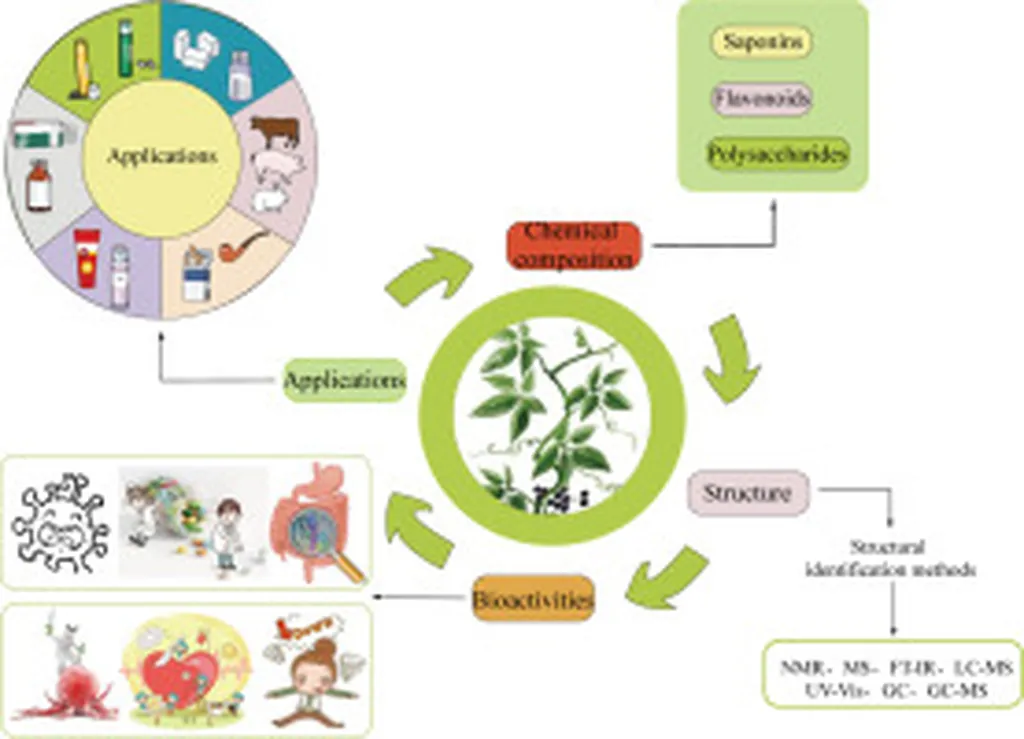In the ever-evolving landscape of veterinary medicine, a groundbreaking study has emerged, offering a glimmer of hope in the fight against porcine epidemic diarrhea virus (PEDV). Researchers from the College of Veterinary Medicine at China Agricultural University, led by Yanxiang Zhang, have uncovered the immunoenhancing effects of Gynostemma Pentaphyllum Extract (Gynostemma P.E.) on mucosal immunity, potentially revolutionizing the way we approach gastrointestinal infections in livestock.
The study, published in the esteemed journal *Frontiers in Veterinary Science* (translated to “Frontiers in Animal Science”), investigated the mucosal immunoadjuvant effects of Gynostemma P.E., a bioactive compound derived from the traditional Chinese medicinal herb Gynostemma pentaphyllum. The findings are nothing short of remarkable, demonstrating that Gynostemma P.E. significantly promotes immune organ development, enhances splenic lymphocyte proliferation, and elevates serum IgG and nasal mucosal secretory IgA (sIgA) antibody levels.
“Our research presents an innovative approach that integrates bioactive compounds from traditional Chinese medicine with intranasal mucosal immunization,” said Yanxiang Zhang, the lead author of the study. “This offers new perspectives for combating gastrointestinal infections in veterinary medicine.”
The study involved twenty-four mice, divided into four groups. The negative control group received only the antigen, while the Gynostemma P.E.-antigen mixture test group was administered intranasally. Two positive control groups were also included, one receiving an intramuscular injection of the antigen and the other an inactivated homemade vaccine. Fourteen days post-booster immunization, spleen samples were collected to assess splenic lymphocyte proliferation activity. Intestinal segments were harvested for histological evaluation, and duodenal intraepithelial lymphocytes (IELs) and IgA-positive cell numbers were quantified via H&E staining and immunohistochemistry (IHC). Serum and mucosal lavage fluid were analyzed for specific IgG and sIgA antibody levels.
The results were clear: Gynostemma P.E. significantly enhanced PEDV-specific mucosal immunity in mice. This finding could have profound implications for the development of safer and more effective PEDV vaccines, and potentially other veterinary vaccines as well. The data supports the use of Gynostemma P.E. as mucosal immunoadjuvants, providing a theoretical framework for future clinical trials.
The commercial impacts of this research could be substantial. PEDV is a significant threat to the swine industry, causing severe diarrhea and high mortality rates in piglets. The development of more effective vaccines could lead to reduced losses for farmers and a more stable food supply. Additionally, the integration of traditional Chinese medicine with modern veterinary practices could open up new avenues for research and development in the field.
As we look to the future, this study offers a promising path forward. By harnessing the power of natural compounds and innovative immunization techniques, we can strive to create a healthier, more resilient livestock population. The work of Yanxiang Zhang and his team is a testament to the potential of interdisciplinary research, blending traditional knowledge with cutting-edge science to tackle some of the most pressing challenges in veterinary medicine.
In the words of Yanxiang Zhang, “This study provides a foundation for developing safer and more effective PEDV vaccines, and offers a theoretical framework for future clinical trials.” The journey towards a PEDV-free future has taken a significant step forward, and the implications for the veterinary and agricultural sectors are immense.

